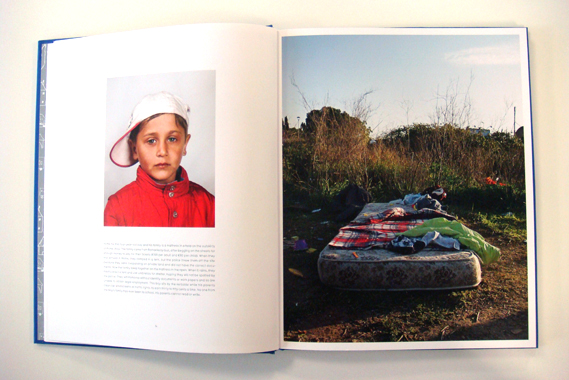
Monday, October 25, 2010
Monday, September 13, 2010
Your eyes can be tricked.
It's kind of a Public Service Announcement of sorts, I suppose, but I'm not sure about the wisdom of this recent optical illusion painted on the road of a British Columbia street. It is supposed to "drive" home the message about watching out for kids on the street. I appreciate the intent, but am not so sure it won't actually cause accidents rather than prevent them.
On the other hand I kind of love this PSA - for a number of reasons I suppose. First off is the soft spot I have in my heart for Jason Bateman, given his involvement in this. Second, I love the demonstration of how things have changed. Make that about cellphone usage nowadays and it might fit - but the idea of lugging around a huge boombox, well, no more.
Public service announcements don't always work. I'm not sure if Jason Bateman's plea to politeness had a noticeable effect on boombox noise pollution in the late 80s, but certainly various campaigns have resulted in shifts in public awareness. For example, one of the most famous - the Back to Sleep campaign - resulted in a 50% reduction in the number of infants suffering from Sudden Infant Death Syndrome. On the other hand, public service campaigns geared towards changing the public's conceptions of how often oil should be changed in a car haven't resulted in any changes, and some, like the funny but unfair (and rightly critiqued) breastfeeding PSAs might have actually led to a backlash.
Which public service announcement do you remember from your childhood? Did they work? Why or why not?
On the other hand I kind of love this PSA - for a number of reasons I suppose. First off is the soft spot I have in my heart for Jason Bateman, given his involvement in this. Second, I love the demonstration of how things have changed. Make that about cellphone usage nowadays and it might fit - but the idea of lugging around a huge boombox, well, no more.
Public service announcements don't always work. I'm not sure if Jason Bateman's plea to politeness had a noticeable effect on boombox noise pollution in the late 80s, but certainly various campaigns have resulted in shifts in public awareness. For example, one of the most famous - the Back to Sleep campaign - resulted in a 50% reduction in the number of infants suffering from Sudden Infant Death Syndrome. On the other hand, public service campaigns geared towards changing the public's conceptions of how often oil should be changed in a car haven't resulted in any changes, and some, like the funny but unfair (and rightly critiqued) breastfeeding PSAs might have actually led to a backlash.
Which public service announcement do you remember from your childhood? Did they work? Why or why not?
Tuesday, September 7, 2010
Back to school. Back to studying.

So, despite the deceptive weather here in Virginia, the march of the seasons goes forward and school begins anew. And rather than spending summer evenings relaxing in the warmth of the season, it's time to buckle down and get back to work - and studying.
I don't think too many people like studying, although certainly the rewards can be great. Studying is something you have to do - it's generally necessary for the genuine acquisition of complex knowledge. Given that - how can you make your studying more effective?
Well, it's apparently not teaching styles.
Take the notion that children have specific learning styles, that some are “visual learners” and others are auditory; some are “left-brain” students, others “right-brain.” In a recent review of the relevant research, published in the journal Psychological Science in the Public Interest, a team of psychologists found almost zero support for such ideas. “The contrast between the enormous popularity of the learning-styles approach within education and the lack of credible evidence for its utility is, in our opinion, striking and disturbing,” the researchers concluded.And, it's
Ditto for teaching styles, researchers say. Some excellent instructors caper in front of the blackboard like summer-theater Falstaffs; others are reserved to the point of shyness. “We have yet to identify the common threads between teachers who create a constructive learning atmosphere..."So what do we know about learning? Well, when you look at what individual behaviors can be used to promote learning, there are some easy to institute behaviors that can help you retain the most bang for your studying buck.
For instance, one helpful technique is to change study location. Generally, advice about performance suggests that one should pick a quiet, uncluttered location and dedicate it to studying. Research, however, seems to indicate that switching locations aids retention, perhaps by encouraging your mind to make multiple associations to material for each of the locations in which you studied, rather than just one.
Switch it up too. Rather than spending all your study block on one subjects, break subjects into short blocks. And while everyone knows that cramming may help for short term memory, it seems to fade rapidly once the test is over. However, people may not realize how strong this effect is. It really matters. Theorists suggest that it may be because when you revisit information, you have to reorient yourself to where you were - kind of like reading a few pages of the book you half forgot over so that you remember where the plot was going. And that process reinforces the material.
“The idea is that forgetting is the friend of learning,” said Dr. Kornell. “When you forget something, it allows you to relearn, and do so effectively, the next time you see it.”Last, practice tests and quizzes can be a powerful means of increasing retention. They show you where your information is lacking, and force you to review materials.
Dr. Roediger uses the analogy of the Heisenberg uncertainty principle in physics, which holds that the act of measuring a property of a particle (position, for example) reduces the accuracy with which you can know another property (momentum, for example): “Testing not only measures knowledge but changes it,” he says — and, happily, in the direction of more certainty, not less.
So here's hoping for a productive term that makes maximal use of your study time.
Tuesday, August 24, 2010
I'll be back momentarily...
I apologize for my long absence. I just completed a move cross-country to Virginia Wesleyan College, where I accepted a position as a faculty member.
No more drizzly Portland days and earnest baristas for me, no more Powell's and the cold and lovely coast, fewer bridges. No more snowy mountains on the horizon, and no roses blooming wild everywhere you look.
I'm sure I will discover great things here too though.
I'll be back to posting on a regular basis. Momentarily.
Moments from Everynone on Vimeo.
No more drizzly Portland days and earnest baristas for me, no more Powell's and the cold and lovely coast, fewer bridges. No more snowy mountains on the horizon, and no roses blooming wild everywhere you look.
I'm sure I will discover great things here too though.
I'll be back to posting on a regular basis. Momentarily.
Moments from Everynone on Vimeo.
Friday, July 2, 2010
Tuesday, June 29, 2010
Philosophy
The Nietzsche Family Circus

Idleness is the parent of psychology
The Nietzsche Family Circus pairs a randomized Family Circus cartoon with a randomized Friedrich Nietzsche quote.

Idleness is the parent of psychology
The Nietzsche Family Circus pairs a randomized Family Circus cartoon with a randomized Friedrich Nietzsche quote.
Saturday, June 26, 2010
Mapping the Brain in Decline

Alzheimer's is a nasty disease, resulting in progressive, permanent, neurological deterioration, leading eventually to dementia - and the loss of the unique you that existed before the disease - even if your heart remains strong and your body robust. The causes and progression of Alzheimer's are not well understood.
One of the reasons research in Alzheimer's has been hampered is because of a lack of a reliable method to diagnose it. Alzheimer's is diagnosed with a constellation of symptoms, including memory loss, mood swings, aggression, symptoms of mental decline, and, most notably, amyloid plaques on the brain. Amyloid plaques - bunches of protein fibers in the gray matter of the brain - are necessary for the diagnosis of Alzheimer's, but testing for their presence was not possible until after the person died and their brain could be examined in an autopsy.
A new study shows great promise in the detection of these plaques, however. In this research, radioactive dye is injected into the brain. This "lights up" the plaques in brain scans, and therefore makes them viewable. This is important for a variety of reasons.
Brain scans that showed plaque could help with some fundamental questions — who has or is getting Alzheimer’s, whether the disease ever stops or slows down on its own and even whether plaque is the main culprit causing brain cell death.Being able to accurately diagnose Alzheimer's would be pivotal in the development of means by which to combat its effects. For example, we might be able to identify people who were in the process of getting Alzheimer's - a breakthrough that could provide help to people before declines begin. It would also give us more information about whether or not new drugs developed to treat it were working.
But my favorite part of this emerging research? The creativity and tenacity of the scientists who conducted the study. The FDA insisted that proof be supplied that the amyloid plaques being detected in the brain scans are the same as the ones that are identified in the brains of dead Alheimer's patients. How can a researcher collect this information in a reasonable amount of time, given that patients with Alzheimer's often survive for decades after the initial diagnosis is made? Well, the researchers came up with a solution to this - conduct research on participants in a hospice, close to death and nearing their final stop in the march of life. While some criticized this initially as being unethical or demeaning to potential participants, the research was allowed to proceed (and from accounts, people were glad to participate). And the research worked. And now, because of this, a new technique to monitor a terrible disease is within our sights.
Science is not pure. It is shaped and molded by pragmatic and ethical constraints. The trick is not just knowing what to study, but how to go about doing so in a way that is both scientifically valid, ethically justifiable, and practically possible. Kudos to this research team for their ingenuity.
Subscribe to:
Posts (Atom)
